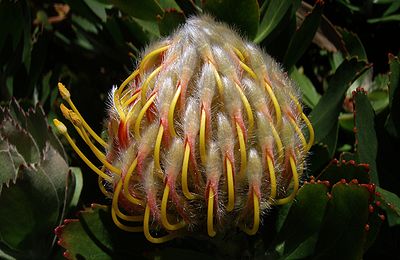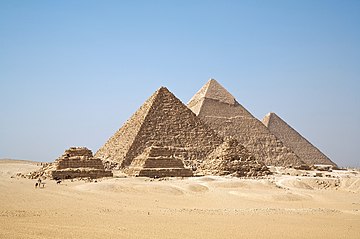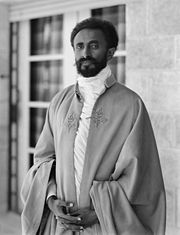Portal:Africa



Africa is the world's second-largest and second-most populous continent after Asia. At about 30.3 million km2 (11.7 million square miles) including adjacent islands, it covers 20% of Earth's land area and 6% of its total surface area. With nearly 1.4 billion people as of 2021, it accounts for about 18% of the world's human population. Africa's population is the youngest among all the continents; the median age in 2012 was 19.7, when the worldwide median age was 30.4. Based on 2024 projections, Africa's population will reach 3.8 billion people by 2099. Africa is the least wealthy inhabited continent per capita and second-least wealthy by total wealth, ahead of Oceania. Scholars have attributed this to different factors including geography, climate, corruption, colonialism, the Cold War, and neocolonialism. Despite this low concentration of wealth, recent economic expansion and a large and young population make Africa an important economic market in the broader global context. Africa has a large quantity of natural resources and food resources, including diamonds, sugar, salt, gold, iron, cobalt, uranium, copper, bauxite, silver, petroleum, natural gas, cocoa beans, and.
Africa straddles the equator and the prime meridian. It is the only continent to stretch from the northern temperate to the southern temperate zones. The majority of the continent and its countries are in the Northern Hemisphere, with a substantial portion and a number of countries in the Southern Hemisphere. Most of the continent lies in the tropics, except for a large part of Western Sahara, Algeria, Libya and Egypt, the northern tip of Mauritania, and the entire territories of Morocco and Tunisia, which in turn are located above the tropic of Cancer, in the northern temperate zone. In the other extreme of the continent, southern Namibia, southern Botswana, great parts of South Africa, the entire territories of Lesotho and Eswatini and the southern tips of Mozambique and Madagascar are located below the tropic of Capricorn, in the southern temperate zone.
Africa is highly biodiverse; it is the continent with the largest number of megafauna species, as it was least affected by the extinction of the Pleistocene megafauna. However, Africa is also heavily affected by a wide range of environmental issues, including desertification, deforestation, water scarcity, and pollution. These entrenched environmental concerns are expected to worsen as climate change impacts Africa. The UN Intergovernmental Panel on Climate Change has identified Africa as the continent most vulnerable to climate change.
The history of Africa is long, complex, and varied, and has often been under-appreciated by the global historical community. In African societies the oral word is revered, and they have generally recorded their history via oral tradition, which has led anthropologists to term them oral civilisations, contrasted with literate civilisations which pride the written word. During the colonial period, oral sources were deprecated by European historians, which gave them the impression Africa had no recorded history. African historiography became organized at the academic level in the mid-20th century, and saw a movement towards utilising oral sources in a multidisciplinary approach, culminating in the General History of Africa, edited by specialists from across the continent. (Full article...)
Selected article –

The apartheid regime in South Africa began in 1948 and lasted until 1994. It involved a system of institutionalized racial segregation and white supremacy, and placed all political power in the hands of a white minority. Opposition to apartheid manifested in a variety of ways, including boycotts, non-violent protests, and armed resistance. Music played a large role in the movement against apartheid within South Africa, as well as in international opposition to apartheid. The impacts of songs opposing apartheid included raising awareness, generating support for the movement against apartheid, building unity within this movement, and "presenting an alternative vision of culture in a future democratic South Africa."
The lyrical content and tone of this music reflected the atmosphere that it was composed in. The protest music of the 1950s, soon after apartheid had begun, explicitly addressed peoples' grievances over pass laws and forced relocation. Following the Sharpeville massacre in 1960 and the arrest or exile of a number of leaders, songs became more downbeat, while increasing censorship forced them to use subtle and hidden meanings. Songs and performance also allowed people to circumvent the more stringent restrictions on other forms of expression. At the same time, songs played a role in the more militant resistance that began in the 1960s. The Soweto uprising in 1976 led to a renaissance, with songs such as "Soweto Blues" encouraging a more direct challenge to the apartheid government. This trend intensified in the 1980s, with racially mixed fusion bands testing the laws of apartheid, before these were dismantled with the release of Nelson Mandela in 1990 and the eventual restoration of majority rule in 1994. Through its history, anti-apartheid music within South Africa faced significant censorship from the government, both directly and via the South African Broadcasting Corporation; additionally, musicians opposing the government faced threats, harassment, and arrests. (Full article...)
Featured pictures –
Did you know (auto-generated) -

- ... that South African civil rights activist Thambi Naidoo was arrested along with Mahatma Gandhi and sent outside of Transvaal for refusing to register?
- ... that Freedom of Religion South Africa filed an unsuccessful lawsuit to keep child spanking legal?
- ... that James A. Merriman was the only Black graduate from Rush Medical College in 1902 and the first African-American physician to practice medicine in Portland?
- ... that Their Highest Potential shows the positive side of segregated schools, as written by a student who was taught in one?
- ... that Carver Court in Coatesville, Pennsylvania, was built to house African-American steelworkers during World War II?
- ... that Anderson Stadium in Austin, Texas, is the last high-school football stadium in the state built exclusively for African-American students?
Categories
Selected biography –
Muhammad Anwar es-Sadat (25 December 1918 – 6 October 1981) was an Egyptian politician and military officer who served as the third president of Egypt, from 15 October 1970 until his assassination by fundamentalist army officers on 6 October 1981. Sadat was a senior member of the Free Officers who overthrew King Farouk I in the Egyptian Revolution of 1952, and a close confidant of President Gamal Abdel Nasser, under whom he served as vice president twice and whom he succeeded as president in 1970. In 1978, Sadat and Menachem Begin, Prime Minister of Israel, signed a peace treaty in cooperation with United States President Jimmy Carter, for which they were recognized with the Nobel Peace Prize.
In his 11 years as president, he changed Egypt's trajectory, departing from many political and economic tenets of Nasserism, reinstituting a multi-party system, and launching the Infitah economic policy. As President, he led Egypt in the Yom Kippur War of 1973 to regain Egypt's Sinai Peninsula, which Israel had occupied since the Six-Day War of 1967, making him a hero in Egypt and, for a time, the wider Arab World. Afterwards, he engaged in negotiations with Israel, culminating in the Camp David Accords and the Egypt–Israel peace treaty; this won him and Menachem Begin the Nobel Peace Prize, making Sadat the first Muslim Nobel laureate. (Full article...)
Selected country –
 |
 |
|

| ||
Zimbabwe, officially the Republic of Zimbabwe, is a landlocked country in southern Africa, between the Zambezi and Limpopo rivers. It borders South Africa to the south, Botswana to the southwest, Zambia to the northwest, and Mozambique to the east. The name Zimbabwe derives from "Zimba Remabwe" meaning "big house of stone" in the Shona language. Its use as the country's name is a tribute to Great Zimbabwe, site of the capital of the Empire of Great Zimbabwe. Zimbabwe's highest peak is Mount Nyangani, which lies within Nyanga National Park in the east of the country. The official language of Zimbabwe is English, however the majority of the population speaks Shona.
Under the leadership of former president Robert Mugabe and the current president Emmerson Mnangagwa, the economy of Zimbabwe declined from one of the strongest in Africa to one of the weakest and political tension has never been higher. In 1999, the Movement for Democratic Change was established and have campaigned for an end to "Mugabe's Reign of Terror". 80% of Zimbabweans are unemployed and inflation has soared to well over 15,000%. (Read more...)
Selected city –
Bouaké (or Bwake, N’ko: ߓߐ߰ߞߍ߫ Bɔ̀ɔkɛ́) is the second-largest city in Ivory Coast, with a population of 740,000 (2021 census). It is the seat of three levels of subdivision—Vallée du Bandama District, Gbêkê Region, and Bouaké Department. The city is located in the central part of Ivory Coast about 50 kilometres (31 mi) northeast of Lake Kossou, the country's largest lake. It is approximately 350 kilometres (220 mi) north of Abidjan on the Abidjan-Niger Railway and about 100 kilometres (62 mi) northeast of Yamoussoukro, the capital of the country. (Full article...)
In the news
- 18 February 2025 – Kivu conflict
- Rwandan-backed M23 rebels advance on the city of Butembo, North Kivu, and capture Kamanyola in South Kivu, Democratic Republic of the Congo after defeating Congolese forces. Local officials say M23 forces are now preparing to advance on Uvira. (AP)
- Burundi initiates the withdrawal of its military forces from the eastern DRC following M23 advances. Between 10,000 and 15,000 Congolese civilians cross into Burundi to avoid violence, with several drowning in the Ruzizi River. (Reuters)
- 18 February 2025 – Sudanese civil war (2023-present)
- Al-Kadaris and Al-Khelwat massacres
- Rapid Support Forces militants kill at least 433 people in the villages of Al-Kadaris and Al-Khelwat, White Nile State, Sudan. (Reuters)
- 18 February 2025 –
- A joint Egyptian-British archaeological mission announces the discovery of the tomb of King Thutmose II, the first royal Egyptian tomb to be discovered since King Tutankhamun's was found in 1922. (CBS News)
- 17 February 2025 – War against the Islamic State
- Islamic State insurgency in Puntland, American military intervention in Somalia
Updated: 3:05, 19 February 2025
General images -
Africa topics
More did you know –
- ...that members of the Senegalese rap group Daara J were hired by campaigners in the Senegalese election of 2000 to edit their speeches?
- ...that Senegalese hip hop group Positive Black Soul's name abbreviation, PBS, is a play on that of the Parti Démocratique Sénégalais, PDS?
- ...that Mamadou Diabaté, a Malian kora player, was nominated for a Grammy Award in 2005, but lost to his cousin Toumani Diabaté?
- ...that, in November 2007, The Sowetan published an article which erroneously claimed that South African political activist Dan Mokonyane had died?
Related portals
Major Religions in Africa
North Africa
West Africa
Central Africa
East Africa
Southern Africa
Associated Wikimedia
The following Wikimedia Foundation sister projects provide more on this subject:
-
Commons
Free media repository -
Wikibooks
Free textbooks and manuals -
Wikidata
Free knowledge base -
Wikinews
Free-content news -
Wikiquote
Collection of quotations -
Wikisource
Free-content library -
Wikispecies
Directory of species -
Wikiversity
Free learning tools -
Wikivoyage
Free travel guide -
Wiktionary
Dictionary and thesaurus
























































































